HALL OF FAME - 2016
Nico Rosberg
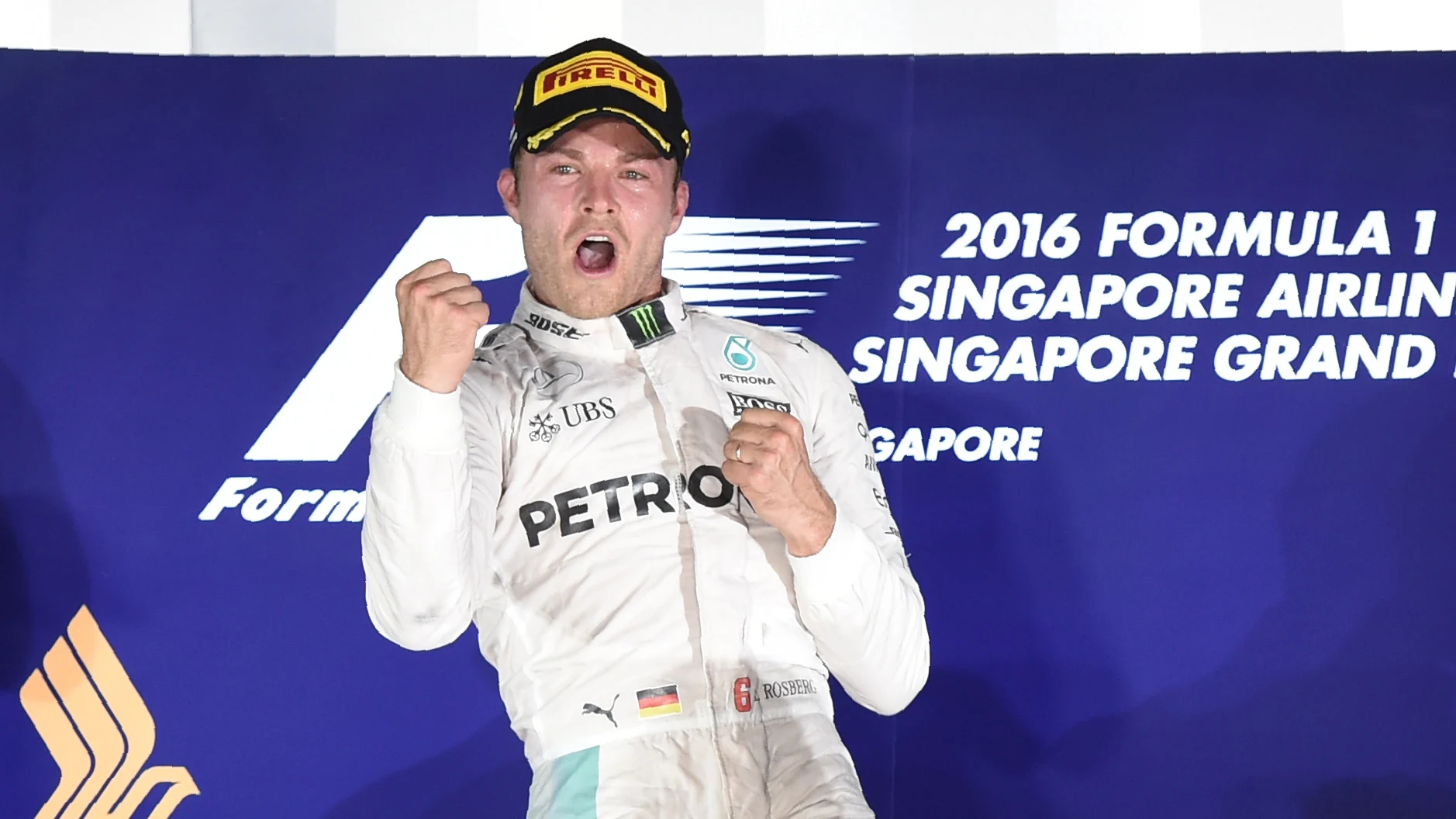
When he was just six years old Nico Rosberg decided he was going to emulate his famous father and become a Formula 1 World Champion. It seemed a far-fetched fantasy, even for a boy benefitting from a privileged upbringing in Monaco. Indeed it took 25 years of hard effort for Nico to make his childhood dream come true. His championship quest took a heavy toll, prompting a final twist in the tale of triumph. Five days after taking the title, in a dramatic last-race showdown with his team mate Lewis Hamilton, the 2016 World Champion announced his immediate retirement from the pinnacle of motorsport.
Nico Erik Rosberg was born on June 27, 1985, in Wiesbaden, Germany, three years after his Finnish father Keke Rosberg won the World Championship. Since his mother Sina was German Nico was entitled to dual citizenship, though he could also be classified as Monegasque because the family resided in the Principality. Growing up in the environment where his dad had won the 1983 race through Monaco’s storied streets gave little Nico big ideas. He was just six years old when his first experiences in a kart inspired his dream of becoming a World Champion, like his dad. Keke and Sina did not discourage this career choice, perhaps believing he would grow out of it. Parental consent came with the proviso that their son must not neglect his education. A diligent student, Nico was quick to learn and precociously clever. He became a linguistic virtuoso, impressively articulate in English, German, French, Italian and Spanish.
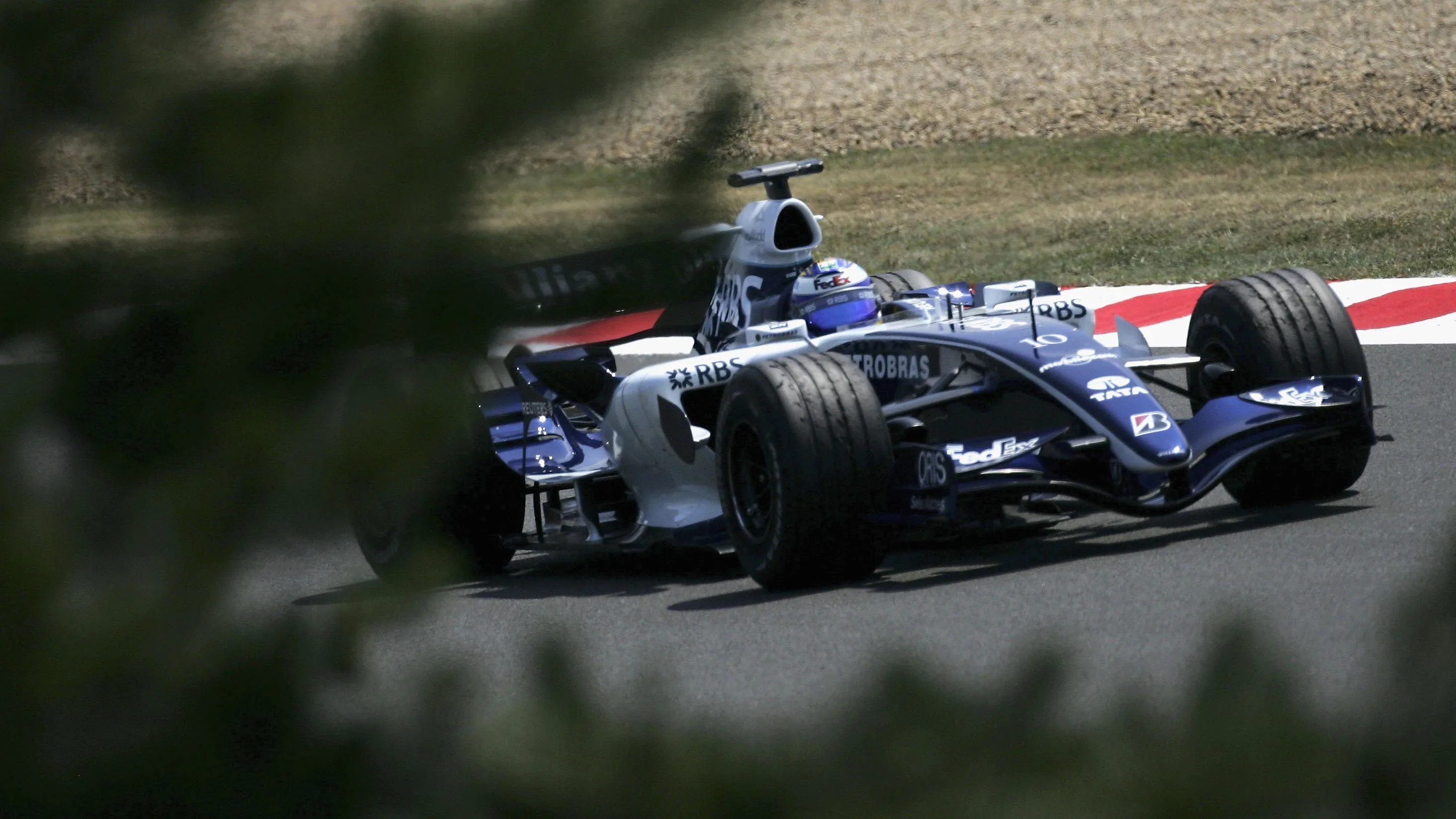
Nico began championship kart racing (using a Finnish passport) when he was ten, bringing with him a competitive mindset that made him cry when his father beat him at tennis. Early success in karts deepened Nico’s resolve to push himself further and convinced his father to help him. Keke became his manager, using his extensive network of connections to good advantage. He knew what he was doing, having shrewdly managed the career of double world champion Mika Hakkinen, who was Nico’s boyhood hero.
Nico progressed rapidly into karting’s top ranks, where one of his main opponents was Lewis Hamilton. In 2000 the teenage prodigies became team mates in the fiercely competitive Formula A karting championship. While the more naturally talented Hamilton tended to beat the hard-trying Rosberg, their rivalry remained friendly. Their shared passion to climb the motorsport ladder made them kindred spirits. They engaged in youthful hijinks, tossing a mattress out the window of their hotel room, staging impromptu foot races down the corridors, gorging themselves in pizza speed-eating contests.
In 2002 their career paths diverged, with Hamilton remaining in karts and Rosberg moving up to single-seaters. In the Formula BMW ADAC series the 17-year-old Rosberg (now racing with a German passport) won the championship and earned himself a F1 test drive with Williams, the team with which Keke won the driving title. Strengthening the family connection, Nico then joined his father’s Team Rosberg to race in the F3 Euroseries, where in two seasons he had four wins. In 2005 Nico entered the new GP2 category with the ART Team. With five wins he became the first GP2 champion, while also serving as a test driver for Williams.
His continuing scholastic achievements served him well. He turned down a coveted place to study aeronautical engineering at Imperial College in London. After scoring the highest-ever marks in the Williams F1 Team’s engineering aptitude test he was signed to race in the 2006 F1 season.
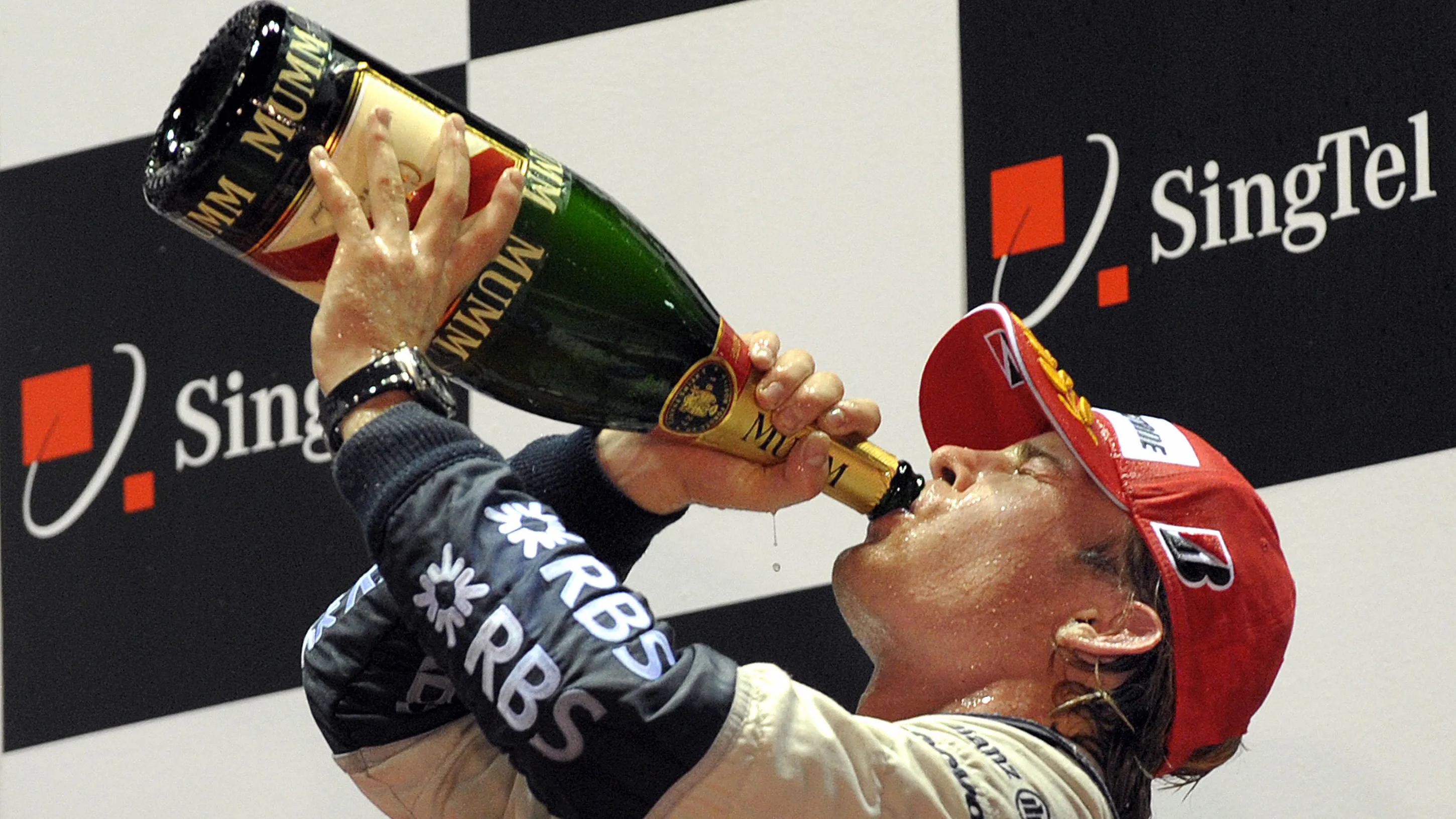
In his three years with Williams his best was the first. In his F1 debut at Bahrain, he set the fastest lap and finished seventh, behind his team mate Mark Webber. It was Webber who nicknamed the youngster with the blonde flowing locks ‘Britney’, after the American pop music star Britney Spears. Indeed there was a beautiful blonde in Nico’s private life: Vivian Sibold, a German-born girl whom he first met when they were children. A romance blossomed and in 2003 they became inseparable companions.
In 2010 Nico joined Mercedes GP (the rebranded championship- winning Brawn F1 team) where he was paired with the seven-time champion Michael Schumacher, then in the twilight of his career. In their three season’s together Rosberg, who mostly out-qualified and outscored him, learned a great deal from the sport’s most successful driver. In 2012 Rosberg scored his first F1 victory, winning from pole in China.
In 2013, with 2008 world champion Lewis Hamilton as his Mercedes team mate, Rosberg won twice, including Monaco (exactly 30 years after Keke won there), though he was outscored during the season by Hamilton, who finished fourth to Rosberg’s sixth overall in the standings. In 2014 Rosberg upped his game, winning five races and scoring regularly to the point that he was still in contention to beat Hamilton to the title in the final race at Abu Dhabi. But Rosberg’s car lost power and Hamilton won the race and the championship. Nonetheless Rosberg’s private life had improved immeasurably. In July of 2014 Nico Rosberg and Vivian Sibold were married in a civil ceremony in Monaco.
With their 2015 Mercedes cars by far the class of the field, the team’s policy of giving them equal opportunity placed maximum pressure on the drivers, whose once friendly rivalry deteriorated into an all-out psychological struggle for supremacy. Hamilton eventually became champion for the third time (with 10 victories to Rosberg’s five - one of which was a third successive triumph in his home race, Monaco). A pivotal point for Rosberg took place in the United States Grand Prix, where his anger at making a driving error that handed the win to Hamilton, provoked the notorious ‘Capgate’ incident. Prior to the podium ceremony Hamilton playfully tossed a sponsor’s cap at Rosberg, who threw it back at him in a fury. Rosberg later admitted he spent two days brooding over this “disastrous” race loss. Vowing to avoid such a “huge disappointment” in future, he hired a mind management specialist, practiced meditation and sharpened his driving skills through endless private testing in a kart. He went on to win the last three races of 2015. However the most important event in his life to date took place that summer when Vivian Rosberg gave birth to their daughter, Alaia. Her proud father spoke movingly of the blessed event. “We are totally overwhelmed and completely in love”.
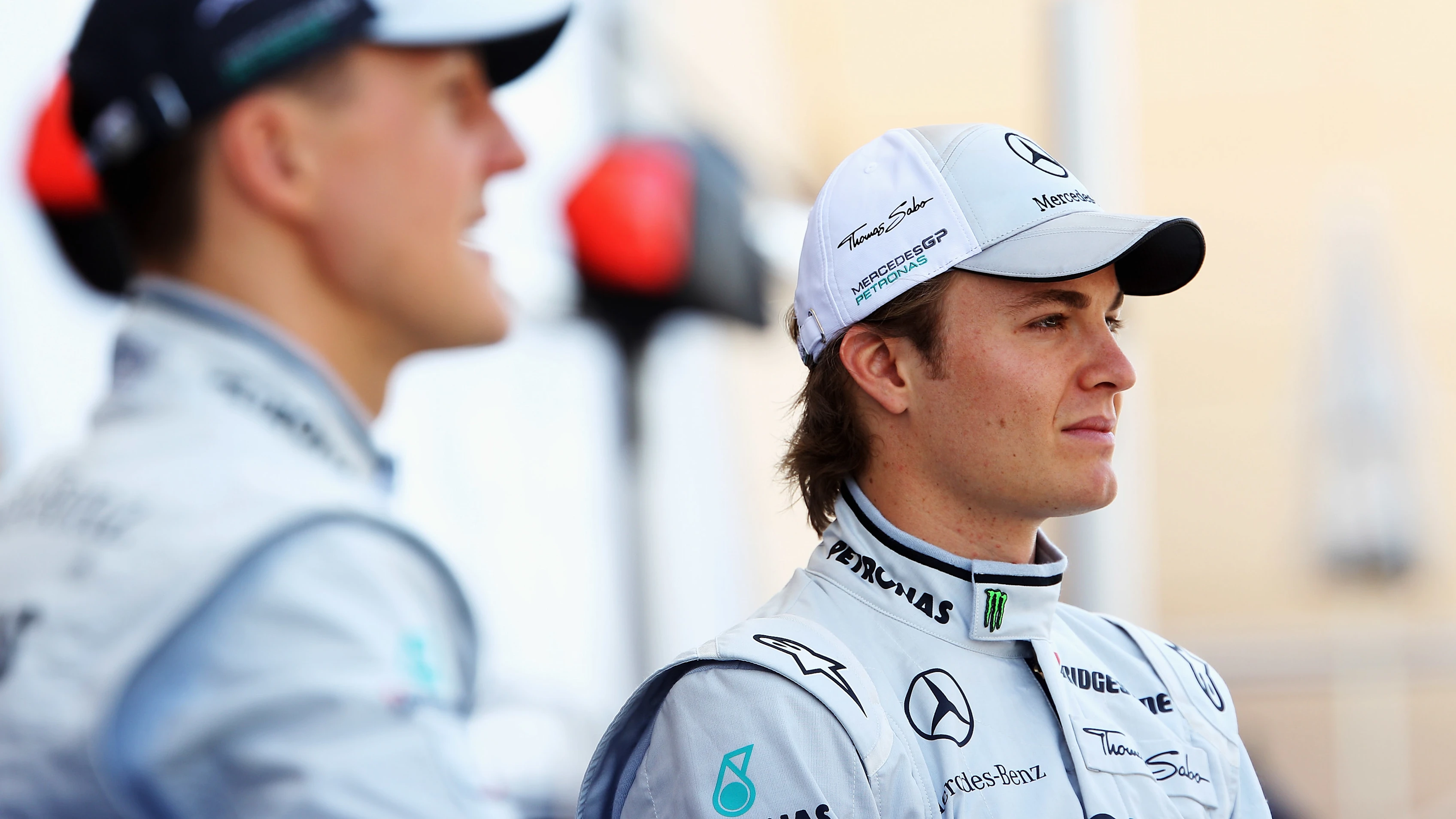
Filled with renewed resolve, the relentlessly resilient Rosberg applied all his cerebral attention to detail toward achieving his championship goal in 2016 - the longest ever Formula One season. He began the 21-race endurance contest with four successive victories. In the fifth event, in Spain, the two title rivals collided on the first lap and went no further. Thereafter they traded race wins (ultimately 10 to 9 for Hamilton), were penalised for rule infractions (four for Rosberg) and suffered mechanical misfortune (five for Hamilton). While Rosberg led the standings for most of the season Hamilton’s victories in the final four races reduced Rosberg’s lead to just five points at the finish, a dramatic, tension-filled event at Abu Dhabi.
At 31, Nico Rosberg’s childhood dream had come true. The 25-year effort had taken a heavy toll. Famously guarded about revealing his inner feelings, the new champion now described the depths of emotion he felt, especially in the final laps at Abu Dhabi when race leader Hamilton (defying team instructions to speed up) deliberately slowed down to back Rosberg into the chasing pack where he might encounter trouble. Rosberg: “The feelings in those last laps were just unreal. Crazy! Not enjoyable. Massive pressure! Unbelievably intense! Horrible! The smallest mistake would finish me. So difficult. The first bit of emotion was relief. I was crying my eyes out at the finish.”
Joining him in tearful post-race celebration were his number-one fans: his wife and his parents. The euphoria was contagious, shared by his team, F1 insiders and an increasing number of supporters. He was applauded for the historic accomplishment of making the Rosbergs only the second father-son champions (after Graham and Damon Hill). Some detractors felt he had backed into the title because Hamilton had more mechanical problems. In truth the new world champion won the same way as his 32 predecessors: by scoring the most points.
The joyful winner responded gracefully to widespread congratulations, paid tribute to Hamilton as one of the best ever drivers and thanked everyone who had helped him during his career. He became surprisingly candid about his psyche, revealing himself prone to serious bouts of self-doubt. He confided that to help quell inner anxieties he deliberately cultivated an inscrutable demeanour, giving bland responses to constant questioning about how he dealt with the pressures of the title fight. He asked for understanding and apologised for “not being completely transparent. I needed to protect myself”.
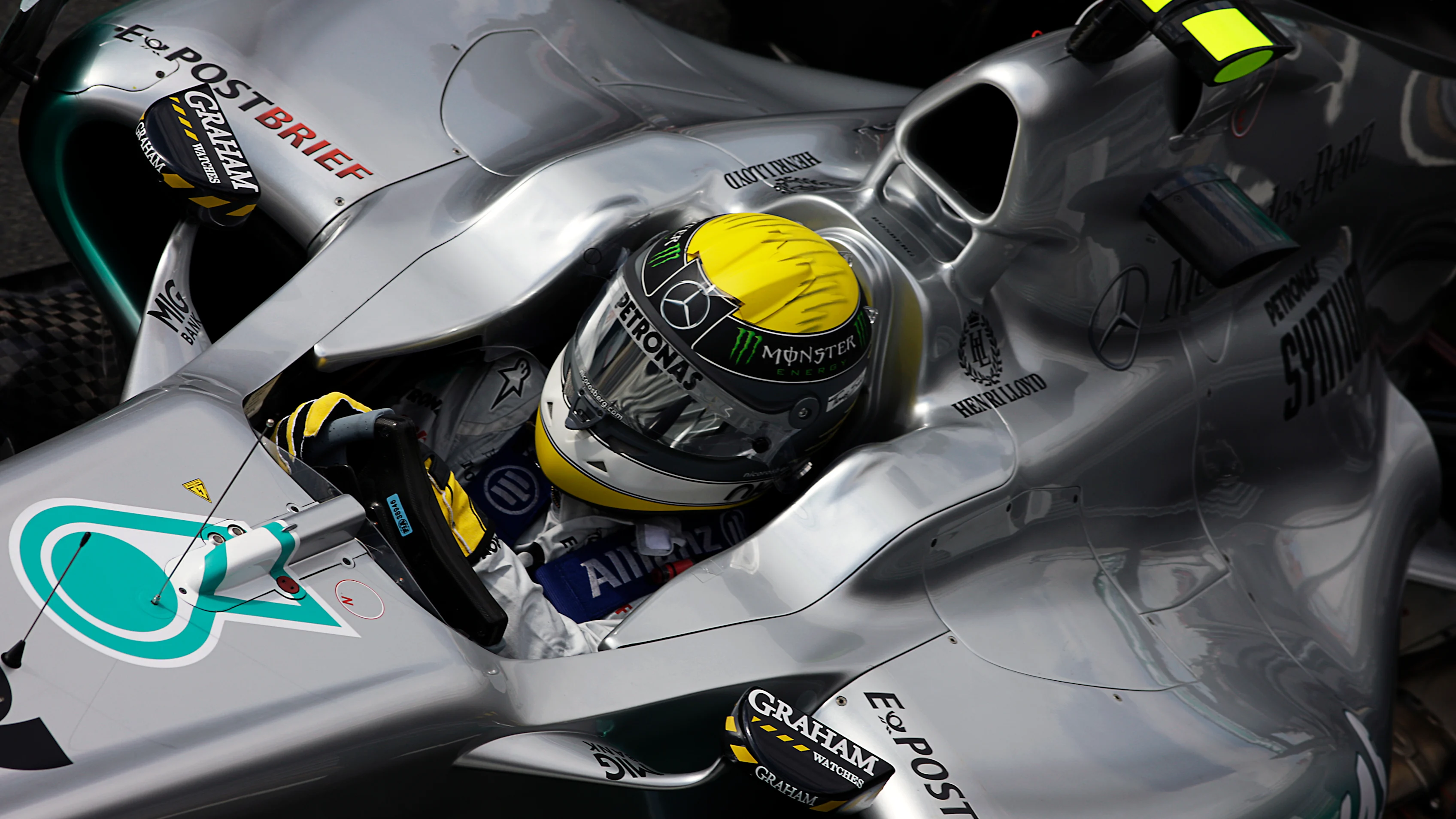
His frank revelations dispelled previously held opinions that he seemed a banal automaton lacking passion. Rosberg the champion proved to be an unpretentious, well-adjusted, affable and amusing character with an easy charm and a ready smile.
He was still smiling when, five days after winning the title, he stunned the sporting world by announcing his retirement with immediate effect. In a touching farewell address, at the FIA prize-giving ceremony in Vienna, he spoke about the hard work, pain and sacrifice that went into fulfilling his childhood dream. He said he was not interested in making that sort of commitment again. He profusely thanked his parents and especially his wife Vivian for her love and loyal support and for looking after their infant daughter without his help when the championship going got tough. From now on he was going to put his family first.
In his first year of retirement Nico Rosberg wasted no time in simply marking time. “I am finally able to enjoy being in control of my own life,” he said. On the family front he welcomed wife Vivian’s birth of another daughter. In his role as a roving ambassador for Mercedes he made guest appearances and gave motivational speeches around the world. He busied himself representing other personal sponsors, became involved in several charitable projects, began managing the career of former F1 driver Robert Kubica. As a F1 pundit on TV networks he distinguished himself as a highly telegenic and articulate commentator. He established his own channel on YouTube, where a slickly-produced series of vlogs documented the continuing adventures of Nico Rosberg.
Text – Gerald Donaldson